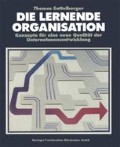Zusammenfassung
Wenn wir uns überlegen, welcher Teil der menschlichen Tätigkeiten noch aus dem eigenhändigen Verändern und Bewegen von Materie besteht, erkennen wir, wie tief wir schon ins Informationszeitalter eingedrungen sind: Der gesamte Rest entfällt nämlich auf verschiedene Formen der Informationsverarbeitung. Dementsprechend können wir Organisationen nur noch als Informationsverarbeitungssysteme wirklich verstehen und gestalten: Wie der Umgang mit Informationen organisiert ist, entscheidet über Effizienz und Lebensqualität. Darüber wurde bisher recht wenig reflektiert. Unsere Gesellschaft ist ziemlich unbedarft ins Informationszeitalter hineingestolpert, hat sich überwiegend gefreut über die mit der Informationstechnologie alle fünf Jahre verbundene Verzehnfachung der Informationsverarbeitungskapazitäten und hat diese zunächst einmal dazu benützt, alterprobte Organisationsmodelle effizienter zu gestalten.
Access this chapter
Tax calculation will be finalised at checkout
Purchases are for personal use only
Preview
Unable to display preview. Download preview PDF.
Literatur
Jantsch, E., Die Selbstorganisation des Universums, München 1979.
Lazlo, E., Evolution, die neue Synthese, Wien 1987.
Luhmann, N., Soziale Systeme, Frankfurt a. M. 1987.
Luhmann, N., Funktionen und Folgen formaler Organisation, Berlin.
Lutz, C., Unternehmensführung im Zeitalter der Kommunikationskultur, in: Lutz Königswieser (Hrsg.), Das systemisch-evolutionäre Management — Neuer Horizont für Unternehmen, Wien 1990, S. 139–149
Lutz, C., Unsere Zukunft: Die Kommunikationskultur, in: IBM-Nachrichten, Jg. 39, 1989, H. 296, S. 13–23.
Lutz, C., Die Kommunikationsgesellschaft, Ein Leitbild für die Politik und Wirtschaft Westeuropas, Rüschlikon 1986.
Lutz, C., Westeuropa auf dem Weg in die Informationsgesellschaft, Kritischer Überblick über Analysen, Prognosen und Optionen, Rüschlikon 1984.
Naisbitt, J., Megatrends — Ten New Directions Transforming Our Lives, New York 1982.
Piore, M. J., Sabel, C. F., Das Ende der Massenproduktion, Berlin 1985.
Prigogine, I., Stengers, I., Dialog mit der Natur, München 1981 und 1986.
Rights and permissions
Copyright information
© 1991 Springer Fachmedien Wiesbaden
About this chapter
Cite this chapter
Lutz, C. (1991). Kommunikation — Kern der Selbstorganisation: Unternehmensführung im Informationszeitalter. In: Die Lernende Organisation. Gabler Verlag, Wiesbaden. https://doi.org/10.1007/978-3-322-83899-5_5
Download citation
DOI: https://doi.org/10.1007/978-3-322-83899-5_5
Publisher Name: Gabler Verlag, Wiesbaden
Print ISBN: 978-3-409-19144-9
Online ISBN: 978-3-322-83899-5
eBook Packages: Springer Book Archive

